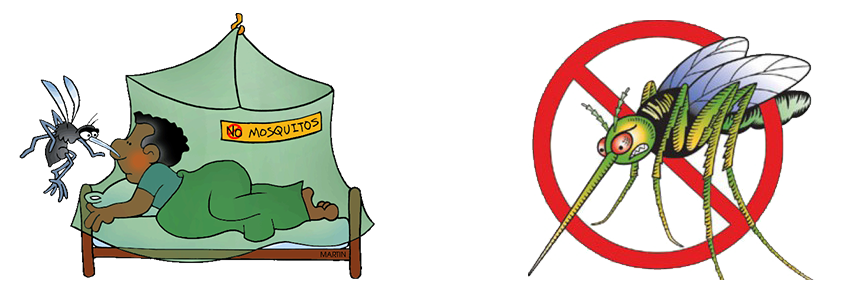Malaria

- Plasmodium vivax
- Plasmodium ovale
- Plasmodium malariae
- Plasmodium falciparum
- Headache, fatigue, abdominal discomfort and muscle ache in the beginning
- Fever is high grade, with chills and rigors and regularly cycling- 48 hourly or 72 hourly
- Falciparum malaria causes fever without a regular cyclic pattern
- Nausea, vomiting
- Delirium
- Mild anemia
- Seizures and unconsciousness mostly with falciparum malaria
- Fever after travel to malaria endemic area
- When signs of serious or complicated malaria are present. This is usually caused by Falciparum malaria
- Confusion
- Seizures
- Low urine output, black brown urine
- Breathing difficulty
- Bleeding
- Blood test-peripheral blood smears for malaria parasite
- Antigen or antibody detection kits or PCR technique are other diagnostic tools
- Use of insecticide treated mosquito nets, wearing long sleeve dress, application of insect repellents (N,N- diethylmethyltoluamide) to exposed parts of the skin are some methods of personal protection.
- Medications to prevent malaria by travelers: Chloroquine, proguanil, mefloquine, doxycycline. Check if malaria transmission occur in your travel area.
- Community level malaria control: insecticide sprays for killing mosquitoes and treatment of stagnant water helps reduce malaria transmission and are done by public health authorities in endemic areas.
Malaria is a febrile, mosquito-borne disease caused by parasitic protozoa, Plasmodium. Four different species of Plasmodium cause malaria. The parasite is transmitted by bite of female Anopheles mosquito. It occurs mostly in high temperature areas – tropical regions and the Terai belt of Nepal.
Infected female Anopheles mosquito carries malaria parasite in its salivary glands. When such Anopheles mosquito bites humans, it injects the sporozoites into blood which are then taken to liver. Here they divide inside liver cells to produce large number of parasites. The liver releases these parasites into blood where they enter red blood cells. They further divide in red blood cells and produce symptoms when they are released on lysis (bursting) of the blood cells. Plasmodium falciparum causes serious and deadly illness affecting brain called cerebral malaria. Some species of Plasmodium (P. vivax and P. ovale) remain inactive in liver which reactivate months later producing symptoms.
Infected people can transmit Plasmodium to Anopheles mosquito and continue the disease transmission cycle.
Rare methods of transmission are through infected blood transfusion or needle sharing.
Disease tends to be severe in pregnant females.
Infected mosquito can spread by air travel, and malaria have been reported in people living close to airports (who have not travelled) in places otherwise without malaria. This is called airport malaria.
Causes
Four species of Plasmodium cause malaria in humans.
Plasmodium falciparum is the most dangerous type and causes almost all deaths due to malaria.
Clinical Features
Features of typical malaria are seen in non-immune individuals. Symptoms can be identified 10-20 days after mosquito bite or after travel to malaria endemic regions.
Red flag signs/When to seek care ?
Diagnosis
The clinical diagnosis of malaria is done by careful history along with travel history and physical examination.
Treatment
Treatment of malaria depends upon disease severity and part of the world it was acquired. The parasite has gained resistance to chloroquine in many parts of the world.
The major drugs used are chloroquine (when sensitive), primaquine, artesunate, Artemether-lumefantrine, Sulfadoxine- pyrimethamine , mefloquine, tetracycline, doxycycline, Atovaquone- proguanil , quinine, quinidine.
Malaria treatment in pregnant women requires special consideration.
Fever management is done with antipyretics, cold sponging or both.
Supportive management is given according to the signs and symptoms or organ involved.
Prevention
Mosquito bite prevention is a crucial step for malaria prevention.



Send us your feedback on this article